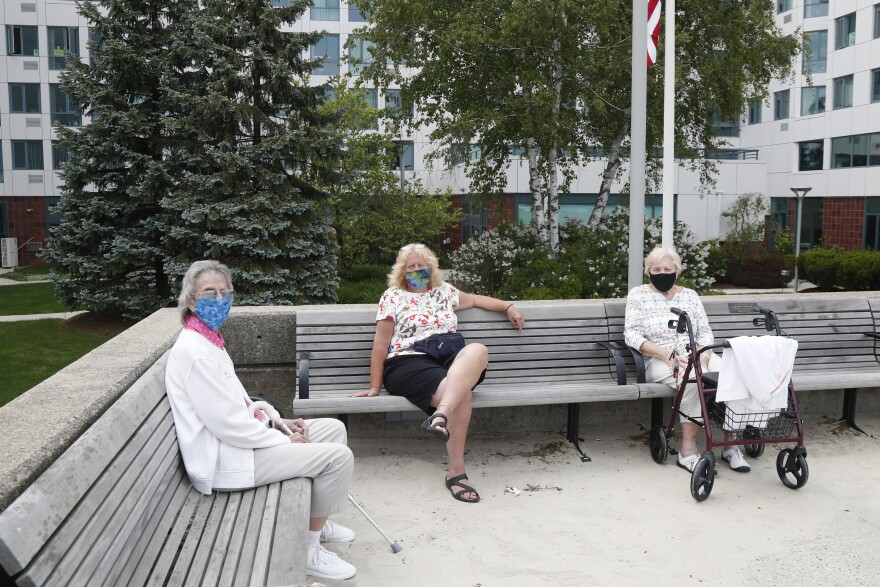In Maine Public’s series “Lessons From The Pandemic,” we've been talking with Mainers about some of the issues that COVID-19 has revealed in communities around Maine, and the lessons we can learn from them for the future.
Attention has been focused on congregate care settings and seniors' vulnerability to COVID-19, but most older Mainers live at home. Jess Maurer, the executive director of the Maine Council on Aging, says the lessons we have learned from the pandemic about technology, telehealth and community involvement could help many more people to safely stay there.
When the pandemic first began, advocates say they quickly saw that many seniors needed help getting access to groceries and medicine, and those who had been receiving home-based care stopped allowing people in, because they were worried about getting COVID-19. Maurer says the shutdown meant an increased need to connect people with agencies that could help them, and when federal money started to flow into the state, that began to happen — and peoples' situation improved.
Maurer spoke with Maine Public's Nora Flaherty:
Maurer: If we start at the very beginning, the legislature passed a rate increase for home and community-based care providers, and that really did help to ensure that those providers could pay their workers more and that their workers would stay. A lot of people could have chosen to take unemployment and make more on unemployment than they would have earned in these jobs, but a lot of the people in these jobs are passionate about the care they provide and would never abandon the people they provide care to. And so making it possible for providers to increase wages was critically important.
Flaherty: In terms of accessing things that they do need, how have things changed for older Mainers during COVID?
A couple of the big pieces — one is that a lot of people now are interacting with what we call the Aging Services Network. They needed something, and they reached out, and they found out how to get that something. So a lot of people needed to know how they could access food and how they could access their prescription drugs and how they could access help during this time. So one silver lining is that a lot of people got connected to services they didn't know existed. The CARES Act money and the Families First money that came in to the Area Agencies on Aging, and the flexibility that they were allowed, allowed them to provide home-delivered meals to more than double the number of people they normally serve. And I think, even more importantly, what they have found is about 50% of the people who are new Meals on Wheels recipients actually qualify for the program. So again, a really good thing that people who need a service have gotten connected to a service that they actually qualify for. So that's a big thing.
The other piece is that for many older people, not all older people, but many older people were reluctant to use technology, and that became something that needed to be accessed, including for things like faith. We've talked to a number of faith leaders in Maine who helped their parishioners get on to Zoom. And certainly the flexibility and allowance for healthcare providers to use telehealth has been a real game changer. And if you think about that in a longer term picture, where you've got somebody living in Machias, who has to drive to Bangor to get the care they need, but who maybe can now see a specialist and not spend six hours on the road, that's a pretty big deal. The Area Agencies on Aging have moved to their evidence-based programming [online] — like falls prevention or Tai Chi for better balance or living-well classes, yoga. You know, there are all these great evidence-based programs that they offer, and they often didn't have huge classes or demand for those classes. And now they're seeing people all over Maine participate in these evidence-based classes because they can do it online. Again, a real benefit to that.
Flaherty: For the positives that we've spoken about, for the gains that people have made, what needs to happen in the future once this is under control so that things continue in that direction?
Maurer: I would say there are three key things. One is continued flexibility and payment for these services. We saw that the payment for the services has to continue or it's the end of the story. But the other piece is an increased focus on broadband technology, and then also getting technology into the hands of older people who don't have access to it.
And you can find more interviews in the "Lessons From The Pandemic" series.


